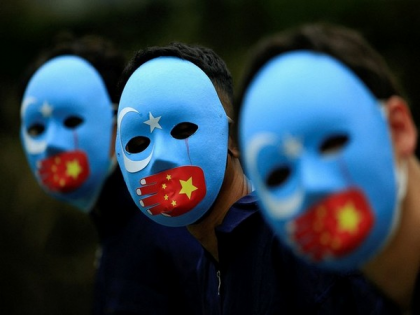Human Rights organisations accuse China of 75-year genocide in Xinjiang
By ANI | Updated: August 11, 2025 18:35 IST2025-08-11T18:28:42+5:302025-08-11T18:35:01+5:30
Washington DC [US] August 11 : Global human rights organisations and political leaders are intensifying calls for action against ...

Human Rights organisations accuse China of 75-year genocide in Xinjiang
Washington DC [US] August 11 : Global human rights organisations and political leaders are intensifying calls for action against China over what experts describe as a 75-year campaign of genocide and resource exploitation in East Turkistan, also known as the Xinjiang Uyghur Autonomous Region.
The Chinese Communist Party (CCP) stands accused of mass killings, forced assimilation, cultural eradication, and industrial-scale forced labour, all while profiting from the region's vast reserves of strategic minerals, according to the report by Cfact.
According to historical accounts, China gained control of the territory in 1949 through Soviet capitulation, inheriting significant infrastructure for mineral extraction. Over subsequent decades, Beijing rapidly expanded its Han Chinese population in the region, from 4% in 1949 to 33% by 1964, while exploiting deposits of lithium, beryllium, magnesium, oil, gas, and other critical resources.
Reports indicate that since 2014, Chinese authorities have escalated repression into what Uyghur independence leader Salih Hudayar calls "full-scale genocide."
Documented abuses include the internment of more than 3 million Uyghurs, Kazakhs, Kyrgyz, and other Turkic peoples in state-run camps, mass sterilisation of women, destruction of over 16,000 cultural and religious sites, pervasive surveillance, systematic sexual violence, and forced separation of nearly 900,000 children from their families, Cfact reported.
A January 20 US State Department fact sheet confirms that over a million Turkic individuals remain detained in more than 1,200 camps. Global Rights Compliance has identified 77 companies linked to forced labour in the region, many of them producing or processing critical minerals for global markets. The recent discovery of a massive zirconium deposit, vital for high-tech military and nuclear applications, has heightened concerns over Beijing's growing strategic leverage, the Cfact report noted.
Despite condemnation from Western parliaments and the United Nations, China continues to hold a seat on the UN Human Rights Council. Critics argue that decades of U.S. and European engagement, including China's accession to the World Trade Organisation and Most Favoured Nation trade status, have enabled ongoing abuses by prioritising economic ties over human rights, according to the Cfact report.
Some analysts draw parallels to the global boycott movement that helped dismantle apartheid in South Africa, urging similar sanctions against Chinese products linked to forced labour. The Trump administration recently launched an investigation into critical mineral imports, while European governments have begun reassessing their dependence on cheap Chinese goods, especially electric vehicles, Cfact report highlighted.
Advocates stress that reducing global reliance on Chinese-controlled supply chains is essential to pressuring Beijing to end its campaign in East Turkistan. Without decisive economic and political action, they warn, the CCP will continue its decades-long policy of demographic engineering, cultural destruction, and resource plunder against a people who never consented to Chinese rule.
Disclaimer: This post has been auto-published from an agency feed without any modifications to the text and has not been reviewed by an editor
Open in app